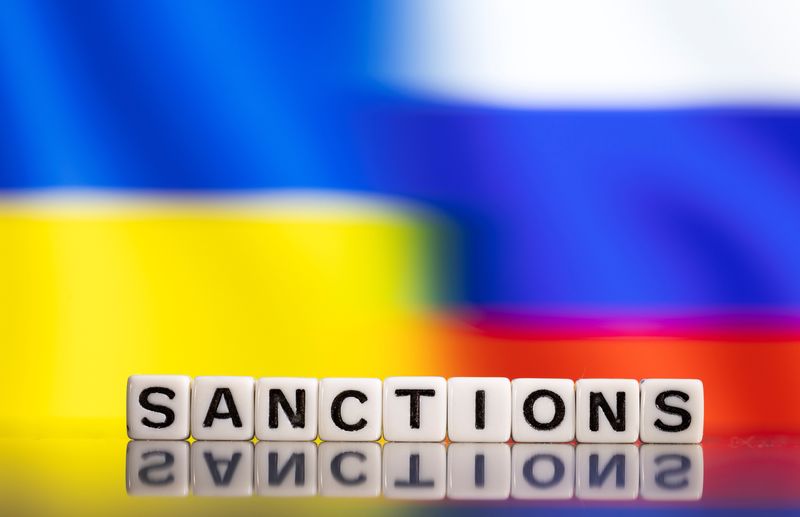By Marc Jones
LONDON (Reuters) - Western officials are edging toward confiscating some of the $300-350 billion worth of frozen Russian financial assets to help support Ukraine, but how it will be done remains highly complex given it would set a contested precedent.
Here are some of the ideas that have been suggested:
CONFISCATION
Some international policymakers and lawyers say the immobilised Russian reserves can simply be confiscated under a doctrine of international law known as "countermeasures". The assets would then be sold or collateralised and the proceeds handed to Ukraine, or to a dedicated reconstruction fund.
Others raise concerns, though, that it would go against international norms and open a legal Pandora (OTC:PANDY)'s box given that it would be something of a precedent and that Russia would challenge the move in the courts.
Previous examples of such seizures, such as of Iraqi assets after Iraq's 1990 invasion of Kuwait, and of German assets after World War Two, happened after those wars had ended, not while they were still raging - as with Russia's invasion of Ukraine.
Even in the United States, leading sovereign debt experts have highlighted that the International Emergency Economic Powers Act (IEEPA) does not authorise an outright confiscation of frozen Russian property in the absence of actual armed conflict between the U.S. and Russia.
SIPHON OFF PROCEEDS
The lion's share of the nearly 210 billion euros ($230 billion) of Russian reserves locked in the EU - essentially bonds and other types of securities in which the Russian central bank had invested - are held in a Brussels-based depository called Euroclear.
When those assets reach their final payout days - or "mature", in banker speak - they get converted into cash, a transaction that is taxed at a rate of 25% in Belgium.
Officials in the EU, as well as in the U.S. and Britain where much smaller amounts are frozen, are therefore proposing ringfencing that type of revenue for Ukraine, estimating it will add up to 15-20 billion euros by 2027.
EU leaders could give the thumbs-up to such a move later this month. Some in the bloc are still wary, though, and the European Central Bank has warned that claiming the trapped Russian assets should only be done in tandem with G7 powers. They want to ensure it isn't just the euro that is affected if other countries such as China start repatriating their reserves as a precaution against them being swooped on down the line.
Some lawyers also point out that, legally, there is little difference between siphoning off the maturity revenues and grabbing the full $300-350 billion.
There is the risk that Russia could, through court action, try and seize Euroclear cash in securities depositories in Hong Kong, Dubai and elsewhere. The worry is that this could drain Euroclear capital and require a huge bailout.
There are plans therefore to set aside some of the siphoned-off money as a safety net.
REPARATION BONDS
"Reparation bonds" have also been suggested as a way of circumventing some of the legal problems. Ukraine would sell securities that pay out if - and only if - it receives reparations from Russia for the damage done by the war.
Interest payments could also roll up and only become payable if Kyiv gets compensation.
The bondholders would not have a contractual claim on the Kremlin’s frozen reserves. But given that Russia is unlikely to pay up willingly, these assets would be the most likely source of cash to pay for damages.
Since the reserves are accruing interest, they could be used to pay both the bonds’ principal and more regular coupon payments. This would be different from confiscation, because the assets would only be transferred if a legitimate compensation mechanism first ruled that damages were due to Ukraine.
Ukraine would have a plausible way to collect on any damages awarded up to the value of the reserves. It could therefore issue reparation bonds up to $300-350 billion. But it would only get anything like this sum if the United States, EU governments and other allies were willing to buy the securities.
SYNDICATED LOAN
The bond idea has been fleshed out further by Lee Buchheit, a veteran legal expert in sovereign debt, and Daleep Singh, who has just returned to the White House as deputy national security adviser for international economics.

Their view is that Ukraine could pledge its claim for reparations against Russia to a syndicate of its allies in return for a loan. If Moscow refused to pay the damages, the allies could then use Russia’s frozen assets to pay off the loan. The justification for doing this is the widely recognised legal principle that, if a creditor controls a debtor’s assets, it can set off those assets against an unpaid debt.
($1 = 0.9183 euros)